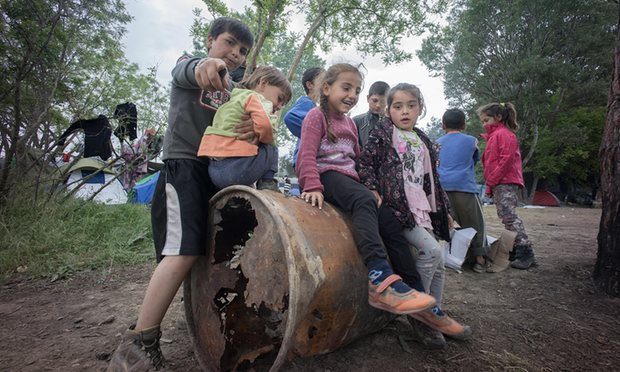UK’s Tories shut down plan to accept 3000 child refugees, Labour Party: “history will judge us.”
Government defeats immigration bill amendment that would have let 3,000 unaccompanied Syrian minors enter UK

The shadow immigration minister, Keir Starmer, has promised that “the fight will go on” to force the UK to do more to help some of the thousands of unaccompanied child refugees stranded in mainland Europe.
In a vote in the House of Commons on Monday night, the government narrowly defeated a cross-party amendment to the immigration bill, tabled in the House of Lords, that would have seen the UK accept 3,000 child refugees.
But speaking on BBC Radio 4’s Today programme on Tuesday, Starmer said: “We can’t turn our backs on these vulnerable children in Europe, and history will judge us for that.” He added: “It’s not over: the fight will go on.”
He also reacted angrily to the suggestion by some opponents of the proposal that helping children who were already in mainland Europe could create a “pull factor” for others.
James Brokenshire, a Home Office minister, had said in Monday night’s debate that the government could not support a policy that would “inadvertently create a situation in which families see an advantage in sending children alone, ahead and in the hands of traffickers, putting their lives at risk by attempting treacherous sea crossings to Europe which would be the worst of all outcomes”.
But Starmer said: “What it boils down to is to say we must abandon these children to their fate, lest if we do anything, others may follow in their footsteps. I am not prepared to take that position.”
MPs voted against the proposals by 294 to 276 on Monday after the Home Office persuaded most potential Tory rebels that it was doing enough to help child refugees in Syria and neighbouring countries. The amendment was backed byLabour, the SNP and Liberal Democrats.
Only a handful of Conservative MPs voted in favour of accepting the child refugees. One of them, Tania Mathias, said accepting children at risk of harm in Europe was the “right thing to do”.
Lord Alf Dubs, who tabled the amendment, was himself a beneficiary of the Kindertransport, the government-backed programme that accepted child refugees from Germany in the run-up to the second world war.
The Commons vote in effect killed off the Dubs amendment because ministers argued it had cost implications and therefore should be exempt from returning to the House of Lords, where it could have been reinstated.
But Labour quickly tabled an alternative proposal, which is expected to be debated in the Lords on Tuesday. Instead of referring to a specific number of refugees, the new amendment attempts to skirt the claim of financial implications by saying how many will be accepted, “shall be determined by the government in consultation with local authorities”.
Yvette Cooper, the chair of Labour’s taskforce on refugees and a former shadow home secretary, had urged Conservative MPs to vote for the Dubs proposal.
After the debate, she said: “It is deeply disappointing that the government has rejected the Dubs amendment – albeit with a reduced majority. Thousands of children are sleeping rough in Europe tonight, vulnerable to exploitation and abuse and Britain should not be turning its back. Alf Dubs will keep pressing this issue in the Lords as we must do our bit to help.”
One teenage refugee from Syria, who met Cooper and Dubs for an event outside parliament, said the government was missing the point when it argued that child refugees were better helped in the region.
The minor, who cannot be named, travelled through 17 countries from Syriabefore reaching Calais and then the UK. Speaking through an interpreter, he said: “Most of the children in the camps do have their families and parents with them but those stranded around Europe and in Calais are very vulnerable because other people could do something to them. That is the fundamental difference between the children in Europe and those in the camps.”
At least 95,000 unaccompanied child refugees are estimated to have applied for asylum in Europe last year.
Europol, the EU’s criminal intelligence agency, estimated in January that 10,000 children had gone missing after arriving in Europe, warning that many had been taken by criminal gangs.
The Home Office made an announcement last week about providing support for up to 3,000 child refugees from camps in the Middle East, but Save the Children and others said it was merely a repeat of an announcement of aid already promised and failed to offer any help to children trapped in Europe.
The government’s statement appears to have convinced some Conservatives who had expressed concerns about the issue, however, including backbench MP David Burrowes, who said he would vote with the government on Monday.
[su_note note_color=”#fefccb”]The views expressed in this article are the author’s own and do not necessarily reflect Libyan News’s editorial policy.[/su_note]
How to submit an Op-Ed: Libyan Express accepts opinion articles on a wide range of topics. Submissions may be sent to oped@libyanexpress.com. Please include ‘Op-Ed’ in the subject line.
- Libya’s HCS invites applicants for key state roles - December 31, 2023
- UK calls on Iran to prevent escalation in Israel-Hamas conflict - November 05, 2023
- Libyan Interior Minister: Immigrant shelter costs a fortune - November 05, 2023


